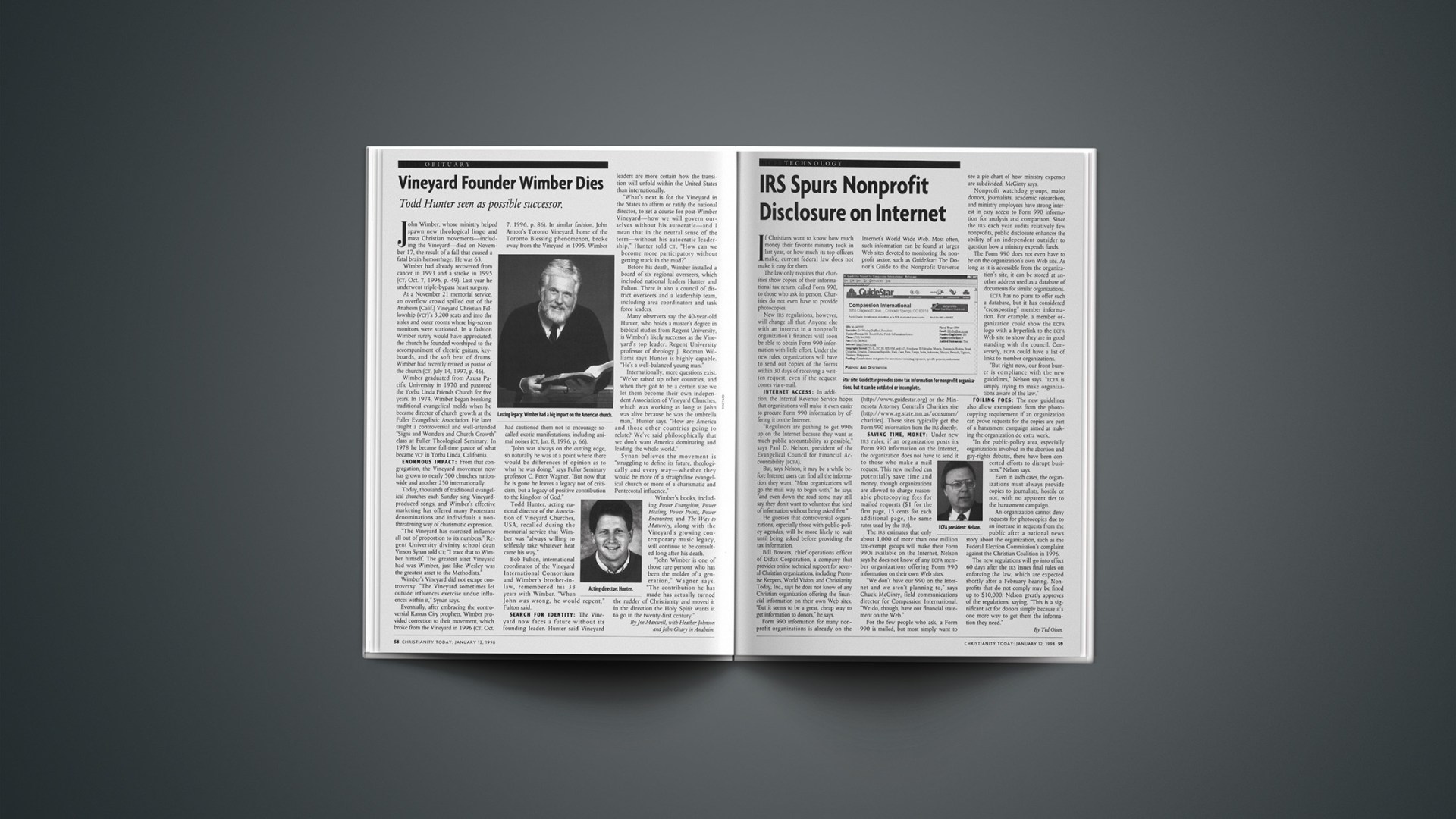If Christians want to know how much money their favorite ministry took in last year, or how much its top officers make, current federal law does not make it easy for them.
The law only requires that charities show copies of their informational tax return, called Form 990, to those who ask in person. Charities do not even have to provide photocopies.
New IRS regulations, however, will change all that. Anyone else with an interest in a nonprofit organization’s finances will soon be able to obtain Form 990 information with little effort. Under the new rules, organizations will have to send out copies of the forms within 30 days of receiving a written request, even if the request comes via e-mail.
INTERNET ACCESS: In addition, the Internal Revenue Service hopes that organizations will make it even easier to procure Form 990 information by offering it on the Internet.
“Regulators are pushing to get 990s up on the Internet because they want as much public accountability as possible,” says Paul D. Nelson, president of the Evangelical Council for Financial Accountability (ECFA).
But, says Nelson, it may be a while before Internet users can find all the information they want. “Most organizations will go the mail way to begin with,” he says, “and even down the road some may still say they don’t want to volunteer that kind of information without being asked first.”
He guesses that controversial organizations, especially those with public-policy agendas, will be more likely to wait until being asked before providing the tax information.
Bill Bowers, chief operations officer of Didax Corporation, a company that provides online technical support for several Christian organizations, including Promise Keepers, World Vision, and Christianity Today International, says he does not know of any Christian organization offering the financial information on their own Web sites. “But it seems to be a great, cheap way to get information to donors,” he says.
Form 990 information for many nonprofit organizations is already on the Internet’s World Wide Web. Most often, such information can be found at larger Web sites devoted to monitoring the nonprofit sector, such as GuideStar: The Donor’s Guide to the Nonprofit Universe (http://www.guidestar.org) or the Minnesota Attorney General’s Charities site (http://www.ag.state.mn.us/consumer/charities). These sites typically get the Form 990 information from the IRS directly.
SAVING TIME, MONEY: Under new IRS rules, if an organization posts its Form 990 information on the Internet, the organization does not have to send it to those who make a mail request. This new method can potentially save time and money, though organizations are allowed to charge reasonable photocopying fees for mailed requests ($1 for the first page, 15 cents for each additional page, the same rates used by the IRS).
The IRS estimates that only about 1,000 of more than one million tax-exempt groups will make their Form 990s available on the Internet. Nelson says he does not know of any ECFA member organizations offering Form 990 information on their own Web sites.
“We don’t have our 990 on the Internet and we aren’t planning to,” says Chuck McGinty, field communications director for Compassion International. “We do, though, have our financial statement on the Web.”
For the few people who ask, a Form 990 is mailed, but most simply want to see a pie chart of how ministry expenses are subdivided, McGinty says.
Nonprofit watchdog groups, major donors, journalists, academic researchers, and ministry employees have strong interest in easy access to Form 990 information for analysis and comparison. Since the IRS each year audits relatively few nonprofits, public disclosure enhances the ability of an independent outsider to question how a ministry expends funds.
The Form 990 does not even have to be on the organization’s own Web site. As long as it is accessible from the organization’s site, it can be stored at another address used as a database of documents for similar organizations.
ECFA has no plans to offer such a database, but it has considered “crossposting” member information. For example, a member organization could show the ECFA logo with a hyperlink to the ECFA Web site to show they are in good standing with the council. Conversely, ECFA could have a list of links to member organizations.
“But right now, our front burner is compliance with the new guidelines,” Nelson says. “ECFA is simply trying to make organizations aware of the law.”
FOILING FOES: The new guidelines also allow exemptions from the photocopying requirement if an organization can prove requests for the copies are part of a harassment campaign aimed at making the organization do extra work.
“In the public-policy area, especially organizations involved in the abortion and gay-rights debates, there have been concerted efforts to disrupt business,” Nelson says.
Even in such cases, the organizations must always provide copies to journalists, hostile or not, with no apparent ties to the harassment campaign.
An organization cannot deny requests for photocopies due to an increase in requests from the public after a national news story about the organization, such as the Federal Election Commission’s complaint against the Christian Coalition in 1996.
The new regulations will go into effect 60 days after the IRS issues final rules on enforcing the law, which are expected shortly after a February hearing. Nonprofits that do not comply may be fined up to $10,000. Nelson greatly approves of the regulations, saying, “This is a significant act for donors simply because it’s one more way to get them the information they need.”
Copyright © 1998 Christianity Today. Click for reprint information.










